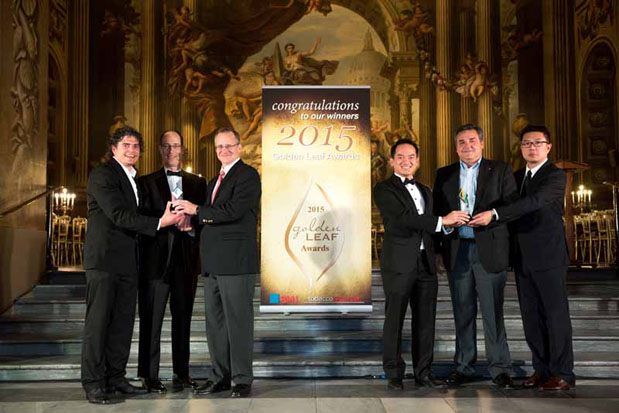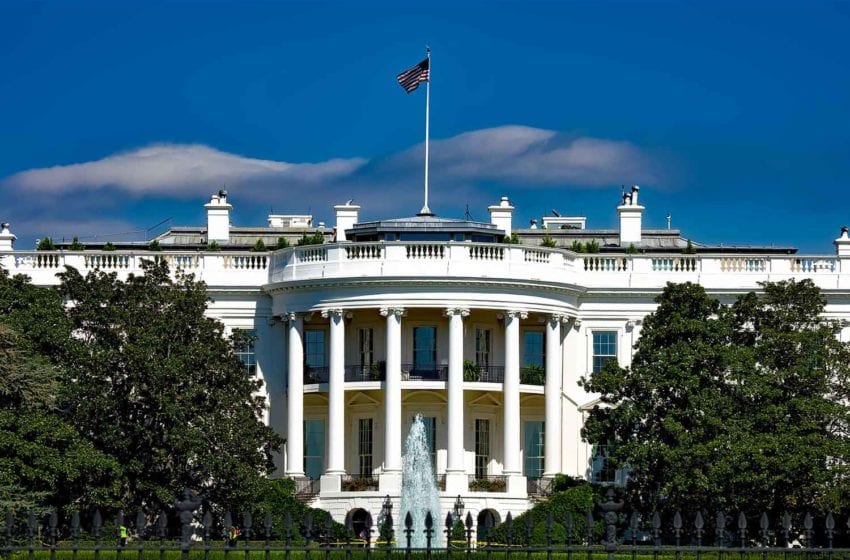
Tobacco Reporter has announced the winners of the 2015 Golden Leaf Awards. During a ceremony at the Global Tobacco & Nicotine Forum in Bologna, Italy, the winners accepted awards for their accomplishments in five different categories. The Golden Leaf Awards are exclusively sponsored by BMJ.
SCM/TDC won a Golden Leaf Award in the ‘Most promising product introduction’ category for its Genesis e-cigarette machine.
Currently the vast majority of e-cigarette hardware is made manually in China, with mixed levels of quality.
As regulation takes effect, quality and safety requirements will become much stricter, and many of the handmade products will fall short of the new standards.
SCM/TDC has developed a machine—the Genesis—to automate parts of the production process and bring production quality up to the high level that is common in the tobacco industry.
The machine is built modularly so that it can accommodate future product design changes, which are likely, given the fast development of e-cigarette technology.
One of the most vital parts of the production process is testing the cartridge or disposable. The Genesis subjects every unit to a smoke test or resistance check. Quality control is carried out quickly and with great accuracy.
This way, only products of the highest quality will end up in the hands of customers, and e-cigarette manufacturers will be able to comply with the strictest regulatory requirements.
Headquartered in the Netherlands, SCM and TDC are members of the ITM Group.
U.S. Tobacco Cooperative received a Golden Leaf Award in the ‘Most outstanding service to the industry’ category for its contributions to the sustainability of U.S. flue-cured tobacco production.
Whereas the major leaf suppliers will return a dividend to their shareholders and investors, USTC reinvests most of its profits back with its contracted tobacco growers.
Since 2010, USTC has declared patronage dividends of $37.9 million to its grower members, including $19.8 million in cash.
Volume and pricing predictability are essential for growers’ viability and the sustainability of their flue-cured crop. As global and domestic demand fluctuates according to sales of manufacturers’ smoking products, USTC’s patronage dividend helps growers offset the impact of supply/demand cuts in contract volumes and is paramount in their ability to invest in growing high-quality, compliant flue-cured tobacco.
The patronage dividend is not a premium, bonus or subsidy and it does not increase the cost of the tobacco to the end user—it is purely the distribution of profits made by USTC from its sales and leaf and related products back to its grower members.
SPV received a Golden Leaf Award in the ‘Most exciting newcomer to the industry’ category.
Headquartered in Shanghai, China, the company was established in 2014 to provide the most consistent and reliable e-liquids, e-cigarettes and accessories, as well as snus, with world-class customer care service.
The company’s mission is to dramatically enhance customers’ experience with new tobacco products.
Backed by the expertise and resources of Huabao International Holdings, SPV has an unparalleled global supply chain, allowing it to secure the world’s best quality raw materials and processing them into finished goods and distributing them around the world.
SPV is also the first massively promoted e-cigarette brand in China. The company is looking to expand internationally and is currently looking for strategic partners in the EU and the U.S.
Alliance One Tobacco Malawi received a Golden Leaf Award in the ‘Most impressive public service initiative’ category for its reforestation program in Malawi.
In Malawi, tobacco provides jobs for 430,000 people and contributes 60 percent of the country’s foreign exchange.
But while Malawi’s “Green Gold” provides substantial economic benefits, the production of tobacco also consumes natural resources. Farmers use wood to cure tobacco and construct barns.
Eager to address the environmental impact of tobacco growing, AOI’s local affiliate, Alliance One Tobacco Malawi, has worked hard improve the success rate of its forestry program. In partnership with customers, it is now growing trees on commercial plantations. Beginning with the 2013-2014 crop season, Alliance One Tobacco Malawi started delivering firewood to contracted farmers, reducing pressure on unsustainable and indigenous wood.
Alliance One Tobacco Malawi’s holistic approach to wood resource management resulted in remarkable success in the 2014-2015 crop season. The company provided its customers with tobacco that is grown from 100 percent sustainable sources. It distributed 5,707,119 seedlings and planted almost 6 million trees across smallholder farms, commercial farms and government plantations.
Customers have been pleased with the progress of the program and Alliance One looks forward to continue partnering with them on various forestry projects.
Universal Leaf Tobacco Co. received a Golden Leaf Award in the “BMJ most committed to quality” category for its commitment to quality and excellence throughout the tobacco supply chain as demonstrated by various projects and initiatives .
As the world’s leading leaf tobacco supplier, Universal has long been a vital link in the global tobacco supply chain. For tobacco production to thrive, the company believes that the supply chain must be preserved and improved through sound production and processing techniques and conducting business according to ethical standards that protect and serve growers, employees, communities, the environment, customers and shareholders.
Those at the beginning of the chain—the tobacco growers—must be able to sustainably produce and profit fairly from their crops. At the other end of the supply chain, tobacco product manufacturers are increasingly demanding not only quality leaf, but quality compliant leaf.
Universal’s manages to simultaneously satisfy, in a competitive manner, these vastly different yet interdependent stakeholders , through its investments in cutting edge extension services, good agricultural practices, research, training and social responsibility initiatives.











